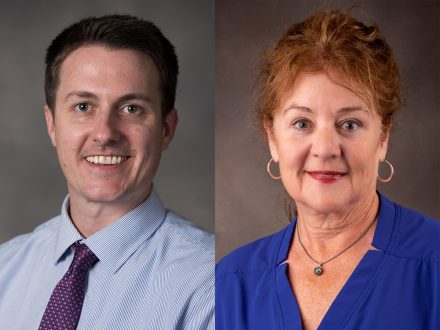The School of Communications colleagues conducted a content analysis of national cable news and broadcast television news coverage between 2015 and 2020 about veterans and service members of the United States military. Their findings were recently published in the quarterly journal Electronic News.
Alex Luchsinger and Jane O’Boyle, assistant professors in the School of Communications, recently collaborated on research comparing how military personnel and veterans are portrayed in broadcast news versus cable news networks outside of war-focused coverage.

Titled “TV News and the Military: Exploring Media Frames of an American Institution,” the article was published on April 25 by Electronic News: Broadcast and Mobile Journalism, a quarterly journal devoted to advancing knowledge and understanding of the news as disseminated through electronic media channels. Electronic News is the official journal of the Broadcast and Mobile News Division of the Association for Education in Journalism and Mass Communication.
Luchsinger and O’Boyle analyzed 300 television news transcripts to examine how broadcast news networks (ABC, CBS and NBC) and cable news networks (CNN, Fox and MSNBC) cover military veterans and service members in news programming. The researchers focused on programming broadcast between 2015 and 2020. According to past research, television news has been shown to provide the agenda for other media like newspapers, as well as social media such as Twitter and Facebook.
“This was an exploratory study so our research questions were aimed at discovery and how we could parlay our findings into future research about this topic,” Luchsinger said. “We found that broadcast networks (ABC, CBS and NBC) tended to humanize stories, while cable networks featured legislative stories, politicians and elite sources.”
A veteran of Iraq and subsequently a network news journalist in Afghanistan, Luchsinger said he was drawn to the research topic due to its lack of previous analysis.
“This is a small, diverse population and most coverage — particularly since September 11 — has focused on war and conflict,” he said. “Most service members and veterans spend a lot of time in non-war settings, and we thought it was important to examine stories outside of conflict zones.”
Luchsinger and O’Boyle, who both earned their doctoral degrees in 2017 from the University of South Carolina, have been frequent research collaborators.
“Dr. O’Boyle is a seasoned researcher and a great colleague,” Luchsinger said. “Working with her is always enjoyable and fruitful.”


